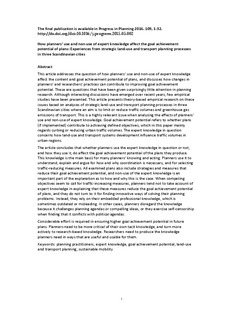| dc.contributor.author | Tennøy, Aud | |
| dc.contributor.author | Hansson, Lisa | |
| dc.contributor.author | Lissandrello, Enza | |
| dc.contributor.author | Næss, Petter | |
| dc.coverage.spatial | Norway | nb_NO |
| dc.date.accessioned | 2019-06-28T12:14:27Z | |
| dc.date.available | 2019-06-28T12:14:27Z | |
| dc.date.created | 2015-06-10T22:44:44Z | |
| dc.date.issued | 2015-06-20 | |
| dc.identifier.citation | Progress in Planning. 2016, 109 (October), 1-32. | nb_NO |
| dc.identifier.issn | 0305-9006 | |
| dc.identifier.uri | http://hdl.handle.net/11250/2602823 | |
| dc.description.abstract | This article addresses the question of how planners’ use and non-use of expert knowledge affect the content and goal achievement potential of plans, and discusses how changes in planners’ and researchers’ practices can contribute to improving goal achievement potential. These are questions that have been given surprisingly little attention in planning research. Although interesting discussions have emerged over recent years, few empirical studies have been presented. This article presents theory-based empirical research on these issues based on analyses of strategic land-use and transport planning processes in three Scandinavian cities where an aim is to limit or reduce traffic volumes and greenhouse gas emissions of transport. This is a highly relevant issue when analysing the effects of planners’ use and non-use of expert knowledge. Goal achievement potential refers to whether plans (if implemented) contribute to achieving defined objectives, which in this paper mainly regards curbing or reducing urban traffic volumes. The expert knowledge in question concerns how land-use and transport systems development influence traffic volumes in urban regions. The article concludes that whether planners use the expert knowledge in question or not, and how they use it, do affect the goal achievement potential of the plans they produce. This knowledge is the main basis for many planners’ knowing and acting. Planners use it to understand, explain and argue for how and why coordination is necessary, and for selecting traffic-reducing measures. All examined plans also include strategies and measures that reduce their goal achievement potential, and non-use of the expert knowledge is an important part of the explanation as to how and why this is the case. When competing objectives seem to call for traffic-increasing measures, planners tend not to take account of expert knowledge in explaining that these measures reduce the goal achievement potential of plans, and they do not turn to it for finding innovative ways of solving their planning problems. Instead, they rely on their embedded professional knowledge, which is sometimes outdated or misleading. In other cases, planners disregard the knowledge because it challenges planning agendas or compelling ideas, or they exercise self-censorship when finding that it conflicts with political agendas. Considerable effort is required in ensuring higher goal achievement potential in future plans. Planners need to be more critical of their own tacit knowledge, and turn more actively to research-based knowledge. Researchers need to produce the knowledge planners need in ways that are useful and usable for them. | nb_NO |
| dc.language.iso | eng | nb_NO |
| dc.publisher | Elsevier | nb_NO |
| dc.rights | Attribution-NonCommercial-NoDerivatives 4.0 Internasjonal | * |
| dc.rights.uri | http://creativecommons.org/licenses/by-nc-nd/4.0/deed.no | * |
| dc.title | How planners' use and non-use of expert knowledge affect the goal achievement potential of plans : Experiences from strategic land-use and transport planning processes in three Scandinavian cities | nb_NO |
| dc.type | Journal article | nb_NO |
| dc.type | Peer reviewed | nb_NO |
| dc.rights.holder | © 2015 The Authors. Published by Elsevier Ltd. | nb_NO |
| dc.description.version | acceptedVersion | nb_NO |
| cristin.unitcode | 7482,0,0,0 | |
| cristin.unitname | Transportøkonomisk institutt | |
| cristin.ispublished | true | |
| cristin.fulltext | postprint | |
| cristin.qualitycode | 1 | |
| dc.identifier.doi | 10.1016/j.progress.2015.05.002 | |
| dc.identifier.cristin | 1247470 | |
| dc.source.journal | Progress in Planning | nb_NO |
| dc.source.volume | 109 | nb_NO |
| dc.source.issue | October | nb_NO |
| dc.source.pagenumber | 1-32 | nb_NO |

